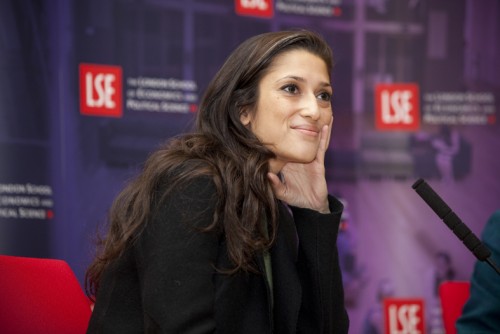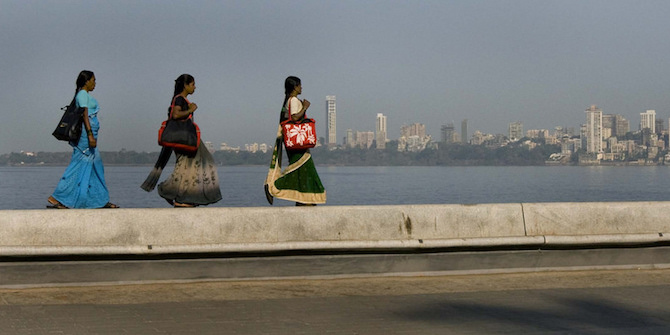Pakistani writer and journalist Fatima Bhutto recently launched her debut novel, “The Shadow of the Crescent Moon”, before a full house at LSE. Saleha Riaz reports on Bhutto’s conversation with LSE’s Dr Mukulika Banerjee about her new book. A version of this article first appeared in The Express Tribune.
Bhutto’s new book, “The Shadow of the Crescent Moon”, is set in Waziristan, a region that is often in the news for all the wrong reasons. Launching the book at LSE, Bhutto said that she wanted to write about northern Pakistan but did not choose Peshawar, Bajaur Agency or Banu as those settings had too many prejudices connected with the Taliban and drones attached to them. Bhutto therefore picked the small town of Mir Ali – albeit a highly fictionalised version of the town – as the setting for her debut novel.
Bhutto also explained that she believes a novel’s characters unfold on their own: “It’s a strange process … You think you are building people, but they make themselves and they change across the writing of the book.”
The characters in Bhutto’s book are struggling with things she herself is curious about, and she sympathised with each of them, whether with their fears, longings or their suffocation. “In all of them, even the ones I didn’t agree with or felt offended by, I didn’t feel I could judge them.”
She was particularly intrigued by a character called Meena, who actively starts attending funerals: “Every morning, she finds out what soyem is happening where, and she turns up and starts asking questions. Meena used to disturb me very much when I was writing,” said Bhutto. “She used to rattle me and as her story started to unfold, I started to see more of her, rather than creating more of her.”
“You let the characters be, which is curious. You don’t actually have the control you have with non-fiction where you build structures that are very definite. With fiction, you observe and follow along,” explained Bhutto while discussing her writing process.
When asked if writing is her way of being political without entering politics, Bhutto argued that Pakistanis do not have a choice but to be political: “It’s what determines how you live and how you die; it is no longer an option to step out of politics.” As far as supporting a particular party is concerned, Bhutto – who is the niece of Pakistan’s former prime minister Benazir Bhutto – said she only supports people on the ground who are doing good work.
Bhutto also lamented that Pakistan is only talked about in terms of CNN headlines and Newsweek stories, rather than people. She complained that news coverage of the country is dehumanising—a report on drone strikes might say that ‘suspected underage militants’ were killed in a strike, when what it means is that children were killed. The need to counter his dehumanising language inspired Bhutto’s writing: “I wanted to write about people, about children—not underage militants,” she proclaimed.
By focusing on the lives of those who exist in what Dr Banerjee described as the twilight zone between Pakistan and Afghanistan, Bhutto also sought to give voice to those who are normally excluded from the mainstream and international media discourse. “Voices [are restricted] to those who can speak English, have been educated abroad, or have computers and can use Twitter,” she pointed out. To know the true state of affairs in more remote parts of Pakistan, for example in the western Balochistan province, Bhutto recommended reading newspapers in vernacular languages from the reason and – most importantly – traveling through the country and meeting people.
For those who can’t make the trip, “The Shadow of the Cresent Moon” offers one glimpse into an alternate version of Pakistan.
Saleha Riaz graduated from LSE with a BA in History in 2008. See The Express Tribune for her complete report of the book launch.









Undoubtedly you are a great person because your vision is big. A person who talks about humanity and justice, you are a truly learned scholar.
you are an inspirational personality, you sound bold and indeed you are. A person like you can make a real difference in the life of millions of people, I salute you